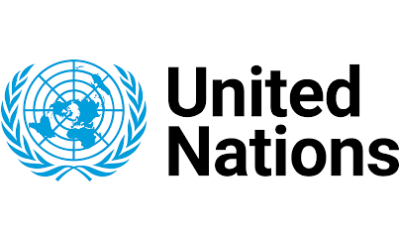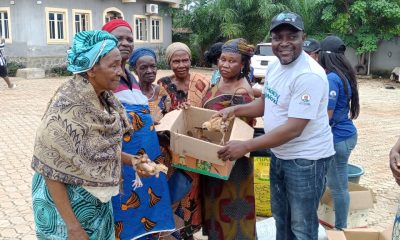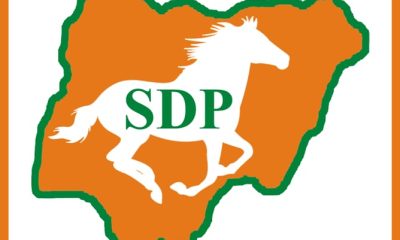Foreign News
25m Children Miss out Vaccination in 2021 – UN

Official data published by UN agencies on Friday shows the largest sustained decline in childhood vaccination rates in approximately 30 years, with 25 million infants missing out on lifesaving shots in 2021.
The figures released by the World Health Organisation (WHO) and UN Children’s Fund UNICEF, show the percentage of children who received three doses of the vaccine.
It shows percentage of children who received three doses of the vaccines against diphtheria, tetanus and pertussis (DTP3) – a marker for immunisation coverage within and across countries – fell five points between 2019 and 2021, to 81 per cent.
The 25 million children who missed out on doses of DTP through routine immunisation services last year is two million more than in 2020, and six million more than in 2019.
“This highlights the growing number of children at risk from devastating but preventable diseases,” the UN agencies said in a statement.
The decline was due to many factors including an increased number of children living in conflict and fragile settings where immunisation access is often challenging.
Increased misinformation on social media and COVID-19 related issues such as service and supply chain disruptions, resources being diverted, and containment measures that limited access to jabs, also played a part.
“This is a red alert for child health. We are witnessing the largest sustained drop in childhood immunisation in a generation. The consequences will be measured in lives,” Catherine Russell, UNICEF Executive Director, said.
“While a pandemic hangover was expected last year as a result of COVID-19 disruptions and lockdowns, what we are seeing now is a continued decline.
“COVID-19 is not an excuse. We need immunisation catch-ups for the missing millions, or we will inevitably witness more outbreaks, more sick children and greater pressure on already strained health systems.”
Some 18 million of the 25 million children missing out, did not receive a single dose of DTP during the year, the vast majority of whom live in low and middle-income countries, with India, Nigeria, Indonesia, Ethiopia and the Philippines recording the highest numbers, the agencies note.
Myanmar and Mozambique are among the countries with the largest relative increases in children who did not receive a single vaccine between 2019 and 2021.
Globally, over a quarter of the coverage of HPV vaccines that was achieved in 2019 has been lost.
This has grave consequences for the health of women and girls, as global coverage of the first dose of Human PapillomaVirus (HPV) vaccine is only 15 per cent, despite the availability of a vaccine for the past 15 years on the global market.
The agencies said they had hoped 2021 “would be a year of recovery during which strained immunisation programmes would rebuild, ” following the first year of the pandemic.
But instead, they stated that DTP3 coverage was set back to its lowest level since 2008, which along with declines in coverage for other basic vaccines, pushed the world off-track to meet global goals, including the immunisation indicator for the Sustainable Development Goals (SDGs).
The decline in immunisation is happening against a backdrop of rapidly rising rates of severe acute malnutrition.
“A malnourished child already has weakened immunity and missed vaccinations can mean common childhood illnesses quickly become lethal to them.
“The convergence of a hunger crisis with a growing immunisation gap threatens to create the conditions for a child survival crisis.”
Vaccine coverage dropped in every region, with the East Asia and Pacific recording the steepest decline, down nine per cent in just two years.
“Planning and tackling COVID-19 should also go hand-in-hand with vaccinating for killer diseases like measles, pneumonia and diarrhoea,” Tedros Ghebreyesus, WHO Director-General said, noting that “It’s not a question of either/or, it’s possible to do both”.
Some countries successfully maintained a high rate of coverage in routine immunisations, such as Uganda, which managed to roll out a targeted COVID-19 vaccination programme to protect priority populations, including health workers.
Pakistan returned to pre-pandemic levels of coverage thanks to high-level government commitment and significant catch-up immunisation efforts.
Monumental efforts will be required to reach universal levels of coverage and to prevent outbreaks, the WHO and UNICEF warned.
Inadequate coverage levels have already resulted in avoidable outbreaks of measles and polio in the past 12 months, underscoring the vital role of immunisation in keeping children, adolescents, adults and societies healthy.
WHO and UNICEF are working with Gavi, the Vaccine Alliance and other partners to deliver the global Immunisation Agenda 2030 (IA2030), a strategy for all countries and relevant global partners to achieve set goals on preventing diseases through immunisation and delivering vaccines to everyone, everywhere, at every age.
“It’s heart-breaking to see more children losing out on protection from preventable diseases for a second year in a row.
“The priority of the Alliance must be to help countries to maintain, restore and strengthen routine immunisation alongside executing ambitious COVID-19 vaccination plans, not just through vaccines but also tailored structural support for the health systems that will administer them,” Dr Seth Berkley, CEO of Gavi, the Vaccine Alliance, said. (NAN)
Foreign News
Australian Researchers Launch Open-source, Affordable DNA Measurement Device

Australian researchers have created an affordable, open-source device to measure DNA levels using parts made with a standard 3D printer.
The Do-It-Yourself Nucleic Acid Fluorometer (DIYNAFLUOR) offers an affordable alternative to expensive commercial DNA fluorometers, often out of reach for many researchers.
This is according to a statement released on Wednesday by Australia’s University of Queensland (UQ), which led the research.
Fluorometers, vital for DNA sequencing, which itself is essential for disease detection, therapeutic innovation, and species identification, can now be easily built at home.
Thanks to the simple, accessible device developed by UQ’s Australian Institute for Bioengineering and Nanotechnology (AIBN), the statement said.
The device can be built in under a day for around 60 Australian dollars (about 39 dollars) using off-the-shelf electronics and 3D-printed parts.
It’s with free instructions online and no need for advanced skills or specialised tools, said the designer of the device, Will Anderson, at the AIBN.
Once built, the device quantifies DNA by using a light beam to produce a fluorescent response from the dyed DNA present in the sample.
It would then report the DNA concentration to a connected computer, Anderson said.
“This is crucial information that can tell you whether you can proceed with more expensive tests and sequencing,” he added.
Laboratory tests confirmed the device matches the accuracy and sensitivity of costly commercial models, offering an affordable, open-source solution for researchers in resource-limited, remote, or educational settings, said the study.
Foreign News
Trump Imposes 25% Tariff on Indian Goods, Criticizes Ties with Russia

U.S. President Donald Trump said he is imposing a 25 per cent tariff on goods from India starting on Friday.
Writing on his Truth Social platform, Trump sharply criticises New Delhi for its military and energy ties with Russia.
He described India as a “friend” but accused the country of maintaining unfair trade practices that disadvantage U.
S. businesses.India has “strenuous and obnoxious” trade barriers that keep its markets closed to companies, he wrote, adding that its tariffs are “far too high.
”Trump also took aim at India’s relationship with Russia, saying: “They have always bought a vast majority of their military equipment from Russia, and are Russia’s largest buyer of ENERGY, along with China.
In addition to the new tariff, Trump said India would face a financial “penalty” for its purchases from Russia, though he did not provide further details.
Foreign News
Zelensky Announces New Draft Law on Anti-corruption Bodies after Protests

Ukrainian President Volodymyr Zelensky said he has approved the text of a draft law guaranteeing the freedom of two anti-corruption bodies in Ukraine – days after nationwide protests broke out over changes curbing their independence.
Kyiv’s Western partners had also expressed serious concerns over the legislation.
On Thursday, Zelensky seemed to backtrack, saying the new bill was intended to safeguard the independence of Ukraine’s National Anti-Corruption Bureau (Nabu) and Specialised Anti-Corruption Prosecutor’s Office (Sap), and to protect them from Russian influence.
He said the text of the bill was “balanced”, but did not provide any details.
The law passed earlier this week brought Nabu and Sap under the control of the prosecutor general, who is appointed by the president.
At the time Zelensky justified his decision to curtail the bodies’ powers by citing Russian influence. The day before, Ukraine’s security services had carried out searches and arrests targeting alleged Russian spies at the agency.
The passing of the legislation instantly sparked the largest protests since the start of Russia’s full-scale invasion in February 2022 in several cities across Ukraine, with many worrying the law would severely undermine the Nabu and Sap’s authority and effectiveness.
Thousands of people gathered in streets and squares across Ukraine, holding placards calling for the legislation to be vetoed.
Several commentators accused Zelensky of democratic backsliding. Their concerns were further exacerbated when Ukraine’s Western partners signalled their displeasure with the bill.
Ukraine has official EU candidate status and a spokesman for European Commission chief Ursula von der Leyen previously warned Kyiv that the rule of law and the fight against corruption were “core elements” of membership to the bloc.
On Thursday, the Commission said it “welcomed” the Ukrainian government’s decision to take action against the bill.
“We are working [with the Ukrainian government] to make sure that our concerns… are indeed taken into account,” the spokesman said.
Nabu and Sap were created in 2014-15 as one of the requirements set by the European Commission and International Monetary Fund to move towards a relaxation of visa restrictions between Ukraine and the EU.
Writing on Facebook, opposition MP Oleksiy Goncharenko noted Zelensky said that “the independence of anti-corruption institutions must be guaranteed.”
“First we take it away, and then we say that it must be guaranteed. So why was all this necessary?”
In his message on social media on Thursday, Zelensky did not acknowledge the protests or the backlash but said it was “important that we respect the position of all Ukrainians and are grateful to everyone who stands with Ukraine.”
































